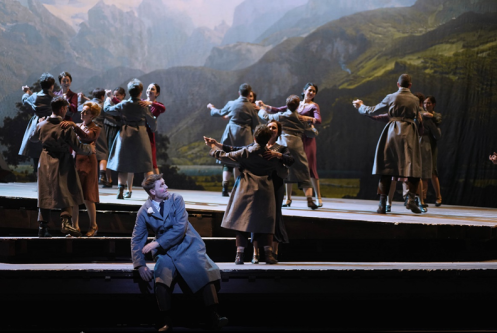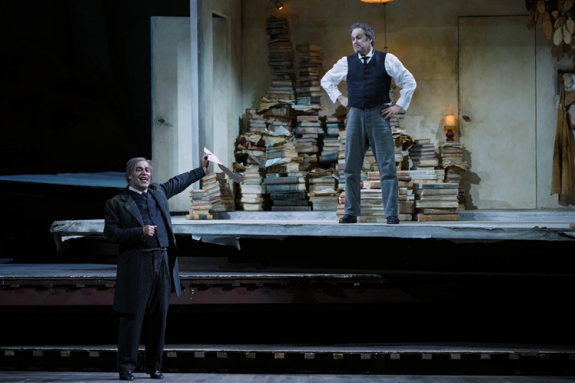 Spain Wagner, Die Meistersinger von Nürnberg: Teatro Real Chorus and Orchestra / Pablo Heras Casado (conductor). Teatro Real, Madrid, 24.4.2024. (JMI)
Spain Wagner, Die Meistersinger von Nürnberg: Teatro Real Chorus and Orchestra / Pablo Heras Casado (conductor). Teatro Real, Madrid, 24.4.2024. (JMI)

This great Wagner opera was last done at Teatro Real in 2001 by Berlin’s Staatsoper Unter den Linden, led by the now, unfortunately, relatively inactive Daniel Barenboim. Expectations for the current performances ran high for this co-production with the Royal Danish Opera of Copenhagen and National Theatre Brno, but we were disappointed. It was an acceptable production but it received rather irregular musical direction and had a less than brilliant cast.
The action takes place at the beginning of the twentieth century. There is a single set for the three acts: large panels with simulated stained glass on both sides and a panel at the back. Platforms are added in the center of the stage where, in Act I, the scebe with the Mastersingers takes place. In the second act, a series of miniature houses represent the city of Nürnberg. These houses disappear in Act III and are replaced by the workshop and house of Hans Sachs. For the meadow scene, the back panel is raised to reveal a beautiful image of a mountain landscape. The production narrates the plot of the opera competently without resorting to the ‘originalities’ of which modern directors are so fond, and the stage direction is fine, especially in the last act.
If the role of the conductor is key in any opera, it is even more so in Wagnerian ones. Hence my eagerness see what Pablo Heras Casado, possibly our most recognized conductor, could achieve. Both at last year’s Bayreuth Festival and in the upcoming one, he is at the helm of Parsifal. His conducting was somewhat uneven with clear ups and downs over the course of the opera. It was certainly far from those occasions of which I have indelible memories: Zubin Mehta and Kirill Petrenko in Munich and, more recently, Christian Thielemann in Dresden. Heras Casado’s conducting was particularly disappointing in Act I, with a flat overture and a sound below what can be expected from this orchestra. Things improved in the second act and, more clearly, in Act III.

There is no doubt that the great protagonist of this opera is Hans Sachs, sung here by bass-baritone Gerald Finley, who was the best of the cast vocally. He is a true artist, as he has proved throughout his long career. At 64, he retains that solid voice which has never been too big but is sufficient in volume. He only gives some sign of weakness in the high notes.
Tenor Tomislav Mužek was Walther von Stolzing who seemed insufficient to me for such an important character. His voice is satisfactory in the middle, but it is clearly reduced in size. It has the added disadvantage that the timbre changes as it moves upwards, resulting in tight and unattractive sounds and eventually reaching a falsetto.
Baritone Leigh Melrose was Beckmesser. He gave an exaggerated interpretation of the character – whether it was his decision or the director’s. Soprano Nicole Chevalier was a correct Eva Pogner. There is no particular brilliance to her voice, and I often found her singing monotonous. Bass Jongmin Park has a big voice, which is well-suited to the character of Pogner.
David, Hans Sachs’s apprentice, was tenor Sebastian Kohlhepp whose light voice suits this character. He did nicely in terms both of singing and acting. Magdalene was mezzo-soprano Anna Lapkovskaja, who was fine. The Mastersingers were properly covered, and bass Alexander Tsymbalyuk was a sonorous Night Watchman.
José M. Irurzun
Production:
Director – Laurent Pelly
Sets – Caroline Ginet
Costumes – Laurent Pelly and Jean-Jacques Delmotte
Lighting – Urs Schönebaum
Chorus master – José Luis Basso
Cast:
Hans Sachs – Gerald Finley
Walther – Tomislav Mužek
Eva – Nicole Chevalier
Beckmesser – Leigh Melrose
Pogner – Jongmin Park
David – Sebastian Kohlhepp
Magdalene – Anna Lapkovskaja
Night Watchman – Alexander Tsymbalyuk
Fritz Kothner – José Antonio López
Kunz Vogelgesang – Paul Schweinester
Konrad Nachtigall – Barnaby Real
Balthasar Zorn – Albert Casals
Ulrich Eisslinger – Kyle van Schoonhoven
Augustin Moser – Jorge Rodríguez Norton
Hermann Ortel – Bjørn Waag
Hans Schwarz – Valeriano Lanchas
Hans Foltz – Frederic Jost

I agree with most of your critique, although I found the sets, costumes and lighting way below par. For such a colourful opera everything on stage was drab, mean and poor. Such a disappointment. It appears to be the current style. Pity!!
I have never heard such disappointing conducting as that from Pablo Heras-Casado. It was flaccid and lacked any dynamism. The orchestra hardly looked at him as he flailed around aimlessly to little effect.